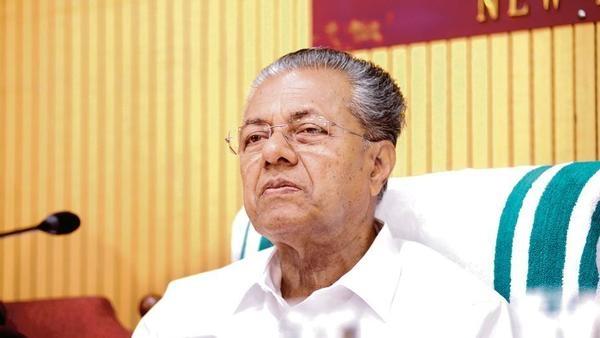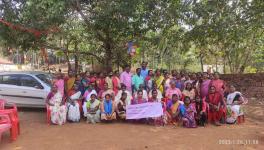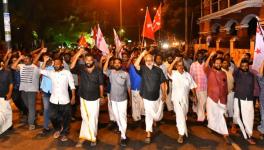Kerala Govt’s 1000 Days: Significant Advancements in Social and Economic Spectrum of State

Kerala Chief Minister Pinarayi Vijayan said that the mood of the state had changed from negative to positive during the 1000 days of Left Democratic Front Government. Image Coutesy: Livemint
The Left Democratic Front (LDF) government in Kerala led by Chief Minister Pinarayi Vijayan has completed its 1000 days in power, marking significant advancements in the social and economic spectrum of the state. Though this time span has witnessed a series of natural disasters including Ockhi, Nipah and Floods 2018, the government had succeeded in building a collective conscience among the masses to overcome the tough times in the history of state.
Timely disbursal of the social security pensions, revival of the public sector undertakings (PSUs), elevation in the quality of services in health sector and in the education sector, infrastructure development, steps to improve the life of the working class, special focus on marginalised classes and castes etc have been highlights of the LDF rule.
While inaugurating the celebrations, on February 20, CM Pinarayi Vijayan said that the mood of the state had changed from negative to positive during the LDF rule. He also added that the corruption has come down, development works have been completed on time, the state has become more investor-friendly, and the agricultural sector has been witnessing a boom.
The inclusive policy of the government has brought all the sections together, and has ensured social security for the marginalised. More than 51 lakh people in the state receive social security pensions, at present. When the government had taken over the power from the United Democratic Front government, the pension amount was Rs 600 per month. It has now been increased to Rs 1,200 a month. Also, 11 lakh new beneficiaries have been added during this time.
Minimum wages have been made applicable in 26 various sectors including one of the most exploitative sectors – the nursing sector. Apart from this, a number of special schemes have been implemented for the migrated labourers who have come to the state in search of work. The government has successfully ensured minimum wages and social security measures for the migrant workers. Apna Ghar housing project for migrant workers, education schemes for the children of the migrant workers, Awaz health insurance for the workers etc have also become milestones of the LDF rule.
Read More: Kerala Shows the Way By Embracing Migrant Workers
Unlike the previous government, the LDF government focuses on strengthening of the public educational institutions in the state. The fresh enrolment of 3.42 lakh students in the state schools in the last two years shows how effective the efforts have been. The Education Department has also ensured free textbooks and uniforms for all the students. About 45,000 classrooms across the state have been upgraded to ‘high-tech’. The government had also taken over four schools which were scheduled to close down.
The state has been witnessing the excellence and effectiveness of the health sector, especially seen at the time of Nipah. During the Nipah outbreak, the Health Department, under the leadership of Health Minister KK Shailaja, had safeguarded the state which could have witnessed much worse damage. As was decided during the post-Nipah outbreak, an Institute of Advanced Virology (IAV) has been established in the state, eight months after Nipah. IAV would be the first institute in the country that is to be linked with the Global Virus Network.
So far, 170 primary health centres have been upgraded to family health centres. Clinical Establishment (Registration and Regulation) Act has also been passed. Arogya Jagratha project to prevent epidemic, Amrutham Arogyam project to control lifestyle diseases etc have also been implemented in the health sector. The vigilance of the Health Department in the post-flood phase in the state has helped to prevent the fatal diseases like leptospirosis and cholera etc.
Though the floods 2018 had rattled the economy of the state, the immediate action of the state government in form of the rescue operations gave a boost to the rebuilding phase. Even the Kerala Budget 2019 proposed 25 new projects to build a post-flood, new Kerala.
Read More: Kerala Flood Relief: Close to 7 Lakh Persons Have Received Financial Aid, Says CM
The floods 2018 had affected 1,269 villages of the total 1,664, and had claimed the lives of 433. A total of more than 14.5 lakh people had been rehabilitated at the time. Though the BJP-led Centre had delayed help to the state, the state government had led the rescue, rehabilitation and rebuild operations with the help of various mass organisations. So far, Rs 5,000 crore have been spent for the rebuilding process.
As per the updated data, the floods had completely damaged 13,362 houses. Out of these, 9,431 families have received the first part of the financial assistance from the government, and the construction work has also started. Rs 101 crore have been disbursed to reconstruct these houses. Houses that were partially damaged have been allotted Rs 770 crore, so far. Rs 195 crore have been distributed in the form of agricultural insurances. To revive the agricultural sector, Rs 198 crore have been spent.
During the inauguration, the chief mister narrated the achievements of his government, pointing out various projects including GAIL pipeline, widening of the national highway, national waterway, the proposed coastal highway and the hill highway, growth in the number of start-ups and investment of the multinational companies like Nissan in the state.
Along with the Public Sector Undertakings (PSUs) in the state, traditional industries like coir, cashew etc are being revived with the active support of the government. It is important to note that the state government is taking efforts to revive the PSUs when the BJP-led Centre is dismantling them.
Though the government invited criticism over certain attacks against the transgender community in the state, the government framed and implemented policies to improve the social and financial status of the community. The state that has always spearheaded social reforms; it has launched a co-operative society exclusively for the transgender community, along with special health schemes and educational schemes etc for the transgender community in the state.
As Finance Minister Thomas Isaac observed during the budget speech, “[W]e are far behind like any other states in the case of gender status, though we have attained certain progress.”
Another flagship programme, Life Mission, which is trying to transform Kerala into a state with housing for all, has achieved about 93 per cent of its initial target. A total of 1,84,255 beneficiaries, who own land, but are homeless, are enlisted for housing assistance in the second phase of the Life Mission.
With inclusive policies, the government’s 1000 days in power clearly show a way to “a new Kerala, Secular, Corruption-Free and Developed”, as promised in LDF’s 2016 election manifesto.
Read More: Inclusive Budget Proposes 25 Projects to Build ‘New Kerala’
Get the latest reports & analysis with people's perspective on Protests, movements & deep analytical videos, discussions of the current affairs in your Telegram app. Subscribe to NewsClick's Telegram channel & get Real-Time updates on stories, as they get published on our website.
























